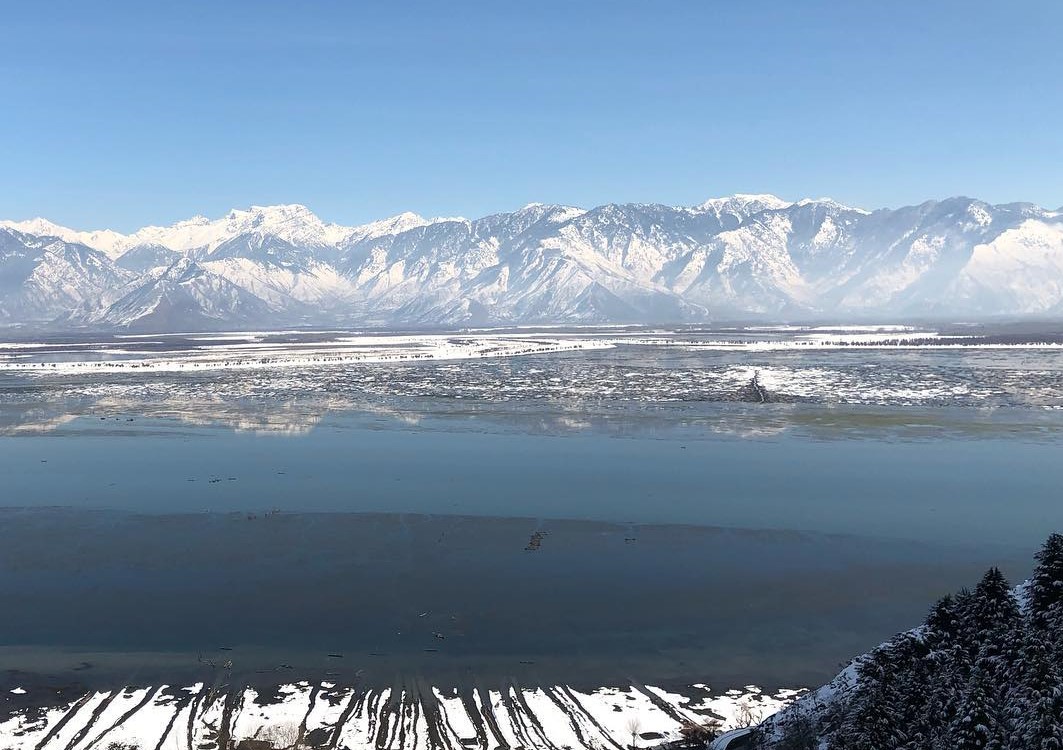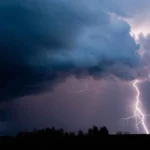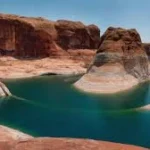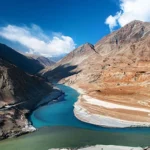
Nestled amidst the breathtaking landscapes of Jammu and Kashmir, Wular Lake stands as a captivating jewel, drawing both locals and visitors alike to its pristine shores. Steeped in geological history and cultural significance, this freshwater expanse unfolds a tapestry of stories that span centuries. From being the largest freshwater lake in Asia to serving as a vital habitat for migratory birds, Wular Lake is not merely a body of water but a living entity intricately woven into the fabric of the region. This introduction invites us to embark on a journey to explore the myriad facets of Wular Lake, from its ecological importance and economic contributions to the challenges it faces in the wake of modernization. Join us as we delve into the depths of Wular Lake, uncovering the tales that ripple across its waters and the landscapes that cradle its shores.
Formation and Origin:
Wular Lake, nestled in the enchanting landscapes of Jammu and Kashmir, owes its formation to the intricate dance of tectonic plates. As the earth’s crust shifted, the Jhelum River altered its course, creating this expansive water body of tectonic origin. This geological phenomenon has bestowed Wular Lake with a unique charm, capturing the essence of the region’s dynamic past.
Location and Area:
Situated majestically in the union territory of Jammu and Kashmir, Wular Lake sprawls over an impressive expanse of approximately 130 square kilometers. The lake’s strategic location places it within the boundaries of districts like Baramulla, Bandipora, and Sopore, forming an integral part of the geographical tapestry of this historically rich region.
Depth:
Descending into the lake’s depths reveals a mesmerizing underwater world, with Wular Lake reaching a maximum depth of around 13.5 meters. This significant depth contributes to the lake’s ecological diversity, providing habitats for various aquatic species and enhancing its role as a crucial water reservoir.
Surrounding Districts:
The serenity of Wular Lake is complemented by its proximity to picturesque districts such as Baramulla, Bandipora, and Sopore. These districts not only contribute to the lake’s scenic beauty but are also intricately connected to the historical and cultural narratives that have unfolded along the shores of Wular Lake over the centuries.
Environmental Importance:
Wular Lake emerges as more than just a body of water; it stands as a sanctuary for migratory birds during the winter months. The lake transforms into a haven for birdwatchers, hosting a diverse array of avian species. This environmental significance underscores the delicate balance between human activity and the preservation of natural habitats in the region.
Ecological Impact:
Beyond its scenic allure, Wular Lake plays a pivotal role in sustaining local fisheries. The lake’s waters are home to a variety of fish species, contributing to the livelihoods of the communities that rely on the fishing industry. This ecological interdependence highlights the delicate harmony that exists between the lake and the human populations inhabiting its shores.
Hydroelectric Projects:
The narrative of Wular Lake is entwined with the development of the region’s energy infrastructure. Notably, the construction of hydroelectric projects, including the Bandipora and Uri Hydroelectric Power Projects, has left an indelible mark on the lake’s landscape. While these projects contribute to the region’s energy needs, they also pose challenges to the lake’s ecological equilibrium, necessitating a delicate balance between development and conservation.
Historical Significance:
Wular Lake weaves itself into the historical fabric of the region, finding mention in ancient texts and manuscripts. Its shores have witnessed the ebb and flow of civilizations, and the lake’s historical significance adds a layer of cultural richness to its already compelling natural beauty.
Largest Freshwater Lake in Asia:
Holding the distinguished title of the largest freshwater lake in Asia, Wular Lake stands as a testament to the grandeur of nature. Its vast expanse not only captivates the eye but also underscores its pivotal role in regional hydrology, acting as a reservoir of life-sustaining freshwater in a region characterized by its natural splendor.
Boating and Tourism:
Wular Lake, with its shimmering waters and surrounding panoramic vistas, beckons tourists and adventure enthusiasts alike. The lake offers an enchanting experience through boating, allowing visitors to traverse its expansive surface and soak in the breathtaking views. The tourism industry around Wular Lake not only supports the local economy but also introduces travelers to the unparalleled beauty of this freshwater gem nestled in the heart of Jammu and Kashmir.
Fishing Industry:
Wular Lake, with its rich aquatic biodiversity, serves as a lifeline for the local fishing industry. The lake’s waters teem with various fish species, contributing significantly to the livelihoods of the communities that depend on fishing. The symbiotic relationship between the lake and the fishing industry highlights the economic importance of preserving the delicate ecological balance of this freshwater ecosystem.
Water Storage Capacity:
Wular Lake boasts a substantial water storage capacity, holding over 60,000 acre-feet of water. This impressive capacity plays a crucial role in regulating water flow, especially during periods of heavy rainfall. The lake’s ability to store and release water helps in mitigating the impact of floods, showcasing its vital role in regional hydrological management.
Floating Gardens:
The picturesque landscape around Wular Lake is adorned with floating gardens, locally known as “Rad.” These unique gardens, built on layers of vegetation and organic matter, not only enhance the lake’s aesthetic appeal but also contribute to the local agricultural practices. The cultivation of crops on these floating gardens adds a distinctive cultural and agricultural dimension to the region.
Conservation Efforts:
Recognizing the ecological importance of Wular Lake, concerted efforts have been initiated to conserve and protect its delicate ecosystem. Measures aimed at controlling pollution, preserving biodiversity, and ensuring sustainable use of resources underscore the commitment to safeguarding the lake for future generations.
Ramman Conservation Reserve:
As a testament to the dedication towards preservation, a portion of Wular Lake has been designated as the Ramman Conservation Reserve. This reserve serves as a sanctuary for diverse flora and fauna, emphasizing the need for maintaining a balance between human activities and the conservation of natural habitats.
Flooding:
Wular Lake emerges as a natural bulwark against floods, absorbing excess water during periods of heavy rainfall. Its role in flood control is vital for protecting the surrounding areas from the devastating impact of inundation, further highlighting the lake’s significance in ensuring the safety and well-being of the local population.
Erosion Control:
Beyond flood control, Wular Lake plays a crucial role in preventing soil erosion in the surrounding regions. The lake’s expansive waters act as a buffer, helping to stabilize the soil and protect the land from the erosive forces of wind and water. This ecosystem service underscores the multifaceted benefits provided by the lake to the local environment.
Historical Trade Route:
Wular Lake, steeped in history, has served as a historical trade route connecting Kashmir with other regions. Its strategic location and navigable waters facilitated the movement of goods, fostering trade and cultural exchange between communities residing along its shores and those in distant lands.
Post-Independence Developments:
Post-independence, Wular Lake has witnessed various developmental projects aimed at enhancing navigation and promoting fisheries. These initiatives reflect the region’s commitment to harnessing the potential of the lake for economic growth while concurrently addressing the need for sustainable and responsible development.
Famous Houseboats:
The shores of Wular Lake are adorned with some of the most famous houseboats, offering a unique and immersive stay experience. These traditional houseboats, with their intricate designs and cultural charm, provide visitors with an opportunity to connect intimately with the lake’s beauty and the rich cultural heritage of the region. The presence of these houseboats adds a touch of nostalgia and romance to the overall allure of Wular Lake as a tourist destination.
Flood Warning System:
To safeguard against potential disasters, a comprehensive flood warning system has been implemented around Wular Lake. This system monitors water levels, enabling timely alerts and responses to potential flooding events. The integration of technology for early warnings underscores the commitment to the safety and well-being of the local population and the sustainable management of the lake’s resources.
Impact of Urbanization:
The rapid pace of urbanization in the surrounding areas has presented challenges to the ecological health of Wular Lake. Increased population density and urban development have led to issues such as pollution, habitat degradation, and changes in land use patterns. Balancing the demands of urban growth with the conservation of this vital ecosystem poses a delicate challenge for local authorities and environmentalists.
Shalabugh:
The area around Wular Lake, particularly Shalabugh, is renowned for its apple orchards and vibrant agricultural activities. Nestled amidst the scenic beauty, Shalabugh contributes to the region’s agricultural prosperity, with its apple produce adding to the economic vibrancy of the communities surrounding Wular Lake.
Endangered Species:
Wular Lake and its adjacent areas are home to some endangered species, including the Hangul deer. The lake’s ecosystem provides a habitat for diverse flora and fauna, and conservation efforts are crucial to ensuring the survival of these endangered species. The presence of such unique and endangered wildlife adds to the ecological significance of Wular Lake.
Local Festivals:
Wular Lake is not only a natural wonder but also a cultural focal point for the local population. Various festivals and events are held around the lake, celebrating its cultural and ecological significance. These festivities provide a platform for the community to come together, reinforcing the bond between the people and the lake that has been an integral part of their history and traditions. The cultural richness surrounding Wular Lake further enhances its status as a symbol of both natural beauty and human heritage.
Frequently Asked Questions about Wular Lake:
1. What is Wular Lake?
Wular Lake is one of the largest freshwater lakes in India, located in the Bandipora district of Jammu and Kashmir. It is situated at an altitude of about 1,580 meters (5,180 feet) and covers an area of approximately 200 square kilometers. The lake is known for its rich biodiversity and serves as an important habitat for various species of birds, fish, and aquatic plants.
2. What is the significance of Wular Lake?
Wular Lake plays a crucial role in the local ecosystem. It acts as a natural flood reservoir, helping to regulate water levels in the region. The lake is also significant for the local economy, providing livelihoods through fishing and tourism. Additionally, it is a vital site for biodiversity, supporting many migratory bird species and endemic plants.
3. What are the main activities to do at Wular Lake?
Visitors to Wular Lake can engage in various activities, including:
- Boating: Tourists can enjoy boat rides on the lake, which provide a unique perspective of the surrounding landscape.
- Fishing: The lake is rich in fish species, making it a popular spot for fishing enthusiasts.
- Bird Watching: The lake attracts numerous migratory birds, making it an ideal location for birdwatching.
- Photography: The scenic beauty of the lake, especially during sunrise and sunset, offers excellent opportunities for photography.
4. What is the best time to visit Wular Lake?
The best time to visit Wular Lake is during the summer months from April to June and during the autumn months from September to November. During these periods, the weather is generally pleasant, making it suitable for outdoor activities. The winter months can be quite cold, while the monsoon season may lead to heavy rainfall, affecting accessibility.
5. Is Wular Lake facing any environmental issues?
Yes, like many natural bodies of water, Wular Lake faces several environmental challenges, including pollution from agricultural runoff, deforestation in the catchment area, and encroachment. These issues threaten the lake’s biodiversity and the livelihoods of local communities that depend on it. Conservation efforts are essential to address these challenges and protect the lake’s ecosystem.
6. How can one reach Wular Lake?
Wular Lake is accessible by road from major cities in Jammu and Kashmir. The nearest town is Bandipora, which is about 15 kilometers away from the lake. The closest airport is in Srinagar, which is approximately 60 kilometers from Wular Lake. Taxis and local transportation options are available for visitors traveling from Srinagar and other nearby areas.
7. Are there any accommodations near Wular Lake?
Yes, there are several accommodations available near Wular Lake, including guesthouses, hotels, and houseboats. Bandipora and nearby areas offer a range of options for visitors, catering to different budgets and preferences. It is advisable to book accommodations in advance, especially during peak tourist seasons.
8. What wildlife can be found around Wular Lake?
Wular Lake is home to a diverse range of wildlife, including various species of fish, birds, and plants. Notable bird species include the Bar-headed Goose, Eurasian Wigeon, and various migratory ducks. The lake’s surrounding wetlands are crucial habitats for these birds, especially during migration seasons.
9. In feet, what is the maximum depth of Wular Lake?
The maximum depth of Wular Lake is approximately 14 feet (about 4.3 meters). This depth can vary due to seasonal changes and water levels influenced by rainfall and snowmelt.









